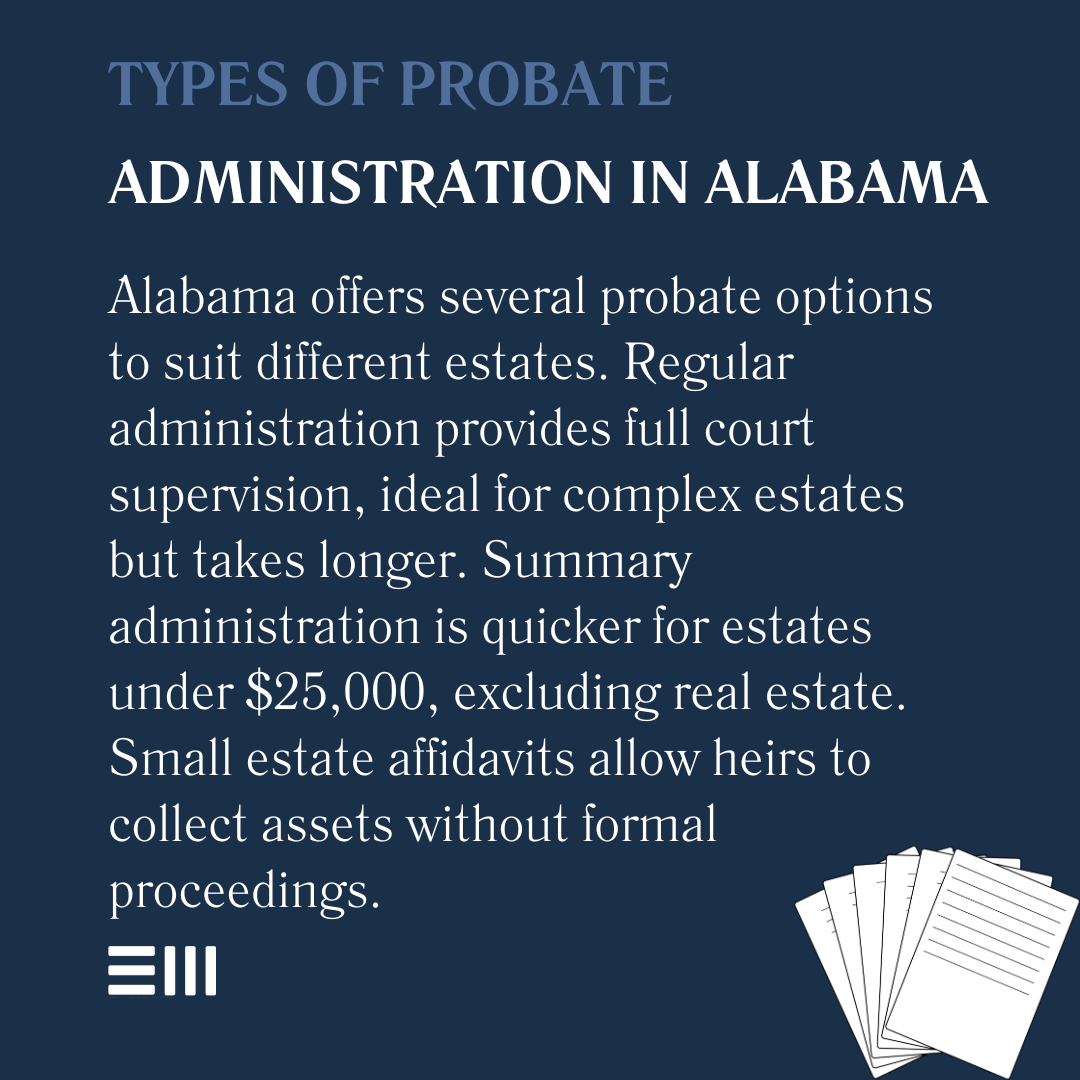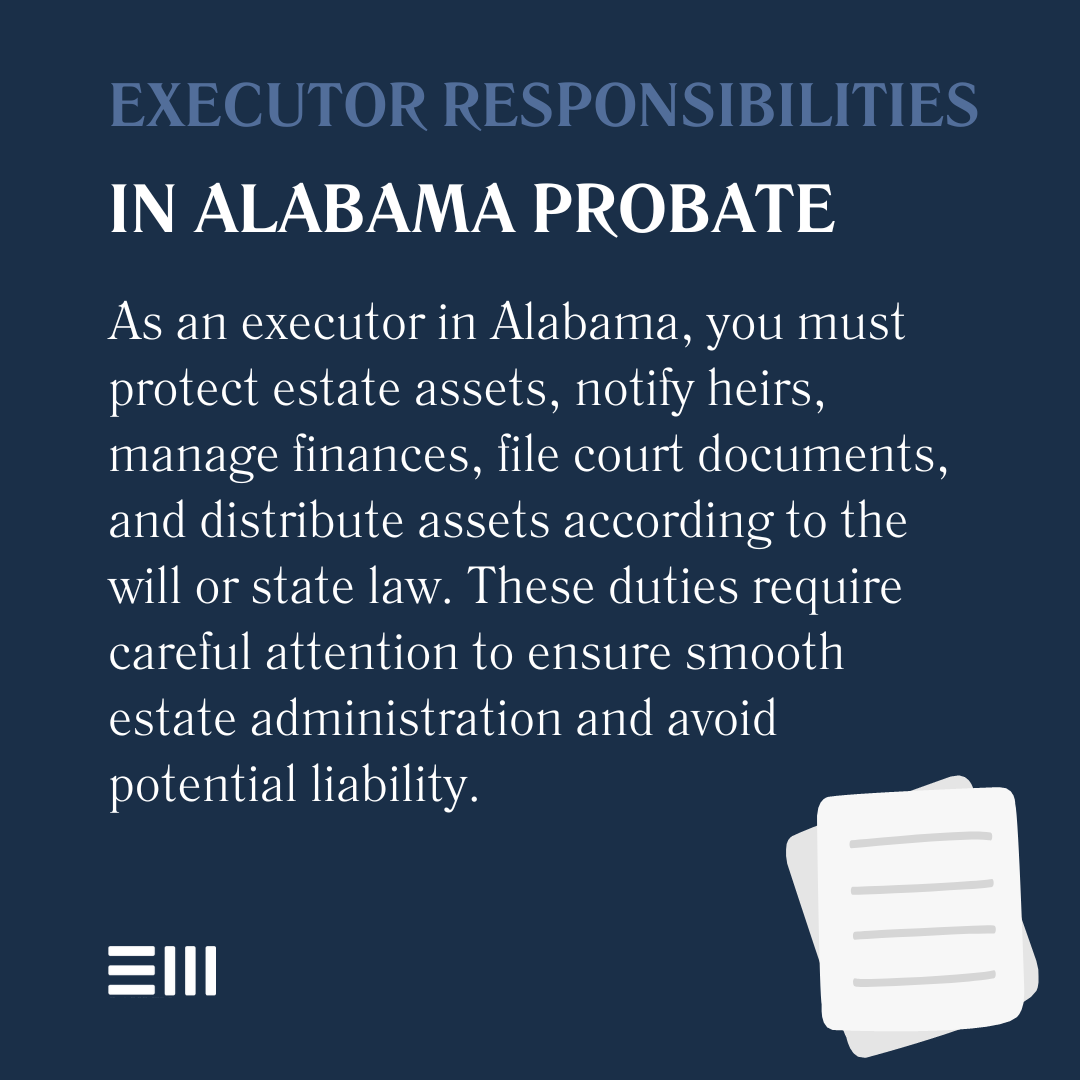Every family heirloom tells a story—from great-grandmother's wedding ring to dad's cherished pocket watch.
In Alabama, these treasured possessions, along with homes, bank accounts, and other assets, pass through a legal journey called probate.
While some view probate as merely a legal process, for Alabama families, it represents the final chapter of a loved one's legacy, ensuring their wishes are honored, and their belongings find their rightful homes.
The Probate Process in Alabama
Alabama's probate system follows distinct steps designed to protect both the deceased person's wishes and their beneficiaries' rights.
Understanding these steps helps executors and family members navigate the process more effectively.
- Filing the will and petition occurs in the county where the deceased person lived, initiating the official probate process;
- The court appoints a personal representative, typically named in the will, who receives "Letters Testamentary" granting legal authority to manage the estate;
- Notice to creditors must be published in a local newspaper, giving them six months to file claims against the estate;
- Asset inventory and appraisal documents all property, bank accounts, investments, and other holdings belonging to the estate.; and
- Tax returns and final bills must be filed and paid before distributing the remaining assets to beneficiaries.
These steps form the foundation of Alabama's probate process, though additional requirements may apply depending on the estate's complexity.
Types of Probate Administration
Alabama offers several paths for probate administration, each suited to different estate situations.
Understanding these options helps families choose the most appropriate approach for their circumstances, potentially saving significant time and money in the process.
- Regular administration handles estates of any size and complexity, providing full court supervision throughout the process. This option offers the most protection for all parties but typically takes the longest to complete.
- Summary administration streamlines the process for smaller estates valued under $25,000, excluding real estate and homestead allowances. This expedited process can often be completed in just a few months rather than the usual six to twelve.;
- Small estate affidavit allows certain heirs to collect assets without formal administration when estates meet specific criteria. This simplified process works well for estates with minimal assets and no real property.
- Ancillary probate handles Alabama property owned by non-residents, requiring additional coordination with out-of-state proceedings. This process ensures proper handling of Alabama assets while respecting primary probate proceedings in other states.
- Direct transfer by affidavit may be available for certain personal property valued at less than $3,000, offering the quickest resolution for very small estates.
Selecting the right type of administration can save time, reduce costs, and simplify the overall probate experience. Working with experienced counsel helps ensure you choose the most appropriate option for your specific situation.
Executor Responsibilities
Personal representatives, also called executors, carry significant responsibilities under Alabama law. Their duties require attention to detail and careful adherence to legal requirements.
- Securing and protecting estate assets from loss or damage throughout the probate process.;
- Identifying and notifying all potential heirs and beneficiaries of their interests in the estate.;
- Managing estate finances, including opening a separate bank account and maintaining accurate records.;
- Filing required court documents and attending hearings as necessary.; and
- Distributing assets according to the will's terms or state law if no will exists.
Understanding and fulfilling these responsibilities helps ensure smooth estate administration and protects executors from potential liability.
Common Probate Challenges
Certain situations can complicate the probate process in Alabama.
Recognizing potential challenges helps families prepare and seek appropriate guidance when needed.
- Missing or unclear will provisions that create confusion about the deceased's intentions;
- Family disputes over asset distribution or executor appointments that may require court intervention;
- Complex assets like business interests or mineral rights that need special handling;
- Outstanding debts or tax issues that must be resolved before distribution; and
- Multiple heirs living in different states or countries, complicating communication and distributions.
Addressing these challenges promptly helps prevent delays and reduces stress for all involved parties.
Timeline and Costs
Understanding probate's duration and expenses helps families plan effectively.
While every estate differs, certain factors consistently influence timing and costs.
- Court filing fees vary by county but typically range from $200-500 for initial petitions;
- Attorney fees often follow reasonable hourly rates or percentage arrangements based on estate value;
- Additional costs may include publication fees, appraisals, and professional services for tax preparation; and
- Asset storage, maintenance, and insurance during probate add to overall expenses.
Planning for these timeframes and expenses helps families maintain realistic expectations throughout the process.
Frequently Asked Questions About Alabama Probate
Families navigating probate often share common concerns about the process.
These answers address the most pressing questions we encounter from executors and beneficiaries.
Does All Property Go Through Probate?
Certain assets bypass probate, including joint property with rights of survivorship, life insurance with named beneficiaries, and properly structured trusts.
How Long Do Creditors Have to File Claims?
Creditors must file claims within six months after receiving notice of the death, though some exceptions exist for government entities.
Can Probate Be Avoided in Alabama?
Yes, through proper estate planning using tools like living trusts, joint ownership, and beneficiary designations.
Many families utilize a combination of these methods to minimize or eliminate the need for probate while ensuring their wishes are carried out efficiently.
What Happens if Someone Dies Without a Will?
Alabama's intestacy laws determine asset distribution based on family relationships, potentially leading to unexpected outcomes.
Who Pays Probate Costs?
The estate typically covers all probate expenses before final distribution to beneficiaries.
Navigate Probate With Confidence
Handling a loved one's estate requires careful attention to legal requirements while managing family dynamics.
Our experienced probate attorneys understand Alabama's unique probate laws and have guided countless families through successful estate administration.
With extensive experience in all Alabama probate courts and a deep understanding of local procedures, we help executors and administrators fulfill their duties efficiently while protecting beneficiaries' interests.
Schedule a consultation to discuss your probate needs and develop a clear path forward. Our team offers compassionate guidance and practical solutions to protect your family's interests throughout the probate process.
From simple estates to complex asset distributions, we provide the knowledge and support you need to navigate probate successfully.


